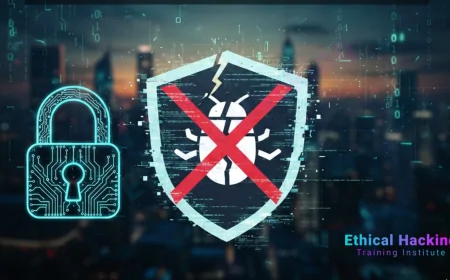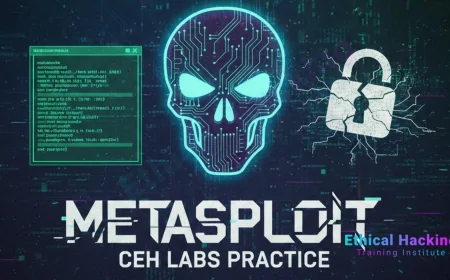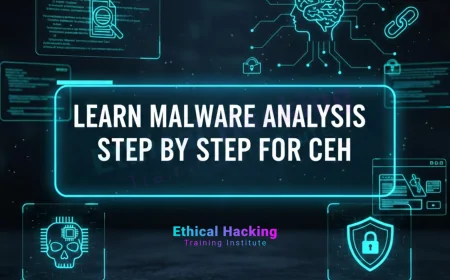Who Is Eligible for OSCP Training? Complete Guide to Prerequisites & Requirements (2025)
Discover who is eligible for OSCP training with this comprehensive 2025 guide covering all prerequisites, skill requirements, beginner advice, and preparation strategies. Whether you're a cybersecurity beginner or IT professional, learn how to get ready for the OSCP certification and become a qualified penetration tester.

The Offensive Security Certified Professional (OSCP) certification is one of the most sought-after credentials in the penetration testing and ethical hacking field. However, due to its hands-on, advanced nature, it's essential to understand who is eligible for OSCP training and what prerequisites are required. Whether you're a beginner in cybersecurity or an IT professional aiming to upskill, this guide breaks down everything you need to know to get started with OSCP training.
What Is OSCP Training?
OSCP (Offensive Security Certified Professional) is a globally recognized certification by Offensive Security. The training focuses on real-world penetration testing skills, vulnerability exploitation, and professional reporting practices. The OSCP exam is a 24-hour hands-on challenge that tests a candidate’s ability to penetrate systems and document findings.
Why Is OSCP Training Challenging Yet Rewarding?
OSCP is not just a theoretical course—it demands real-world hacking practice. This is why eligibility and readiness matter. Successful candidates often spend several weeks mastering tools, practicing on labs, and simulating exploits.
Who Should Consider OSCP Training?
You should consider OSCP training if you fall under the following categories:
-
IT professionals with knowledge of networking, Linux, or system administration
-
Cybersecurity analysts looking to move into offensive roles
-
Developers or engineers interested in ethical hacking
-
Graduates or students with foundational knowledge in security or scripting
-
Self-taught hackers ready to formalize their penetration testing skills
OSCP Prerequisites: What You Should Know
There are no strict formal education requirements, but candidates should meet several technical prerequisites to succeed in OSCP training.
✅ Core Prerequisites for OSCP Training
| Skill Area | Requirement Level | Importance |
|---|---|---|
| Linux & Bash | Intermediate command-line usage | High – most machines are Linux |
| Networking Concepts | TCP/IP, ports, protocols | High – vital for enumeration |
| Windows Fundamentals | User access, permissions, tools | Medium – for privilege escalation |
| Scripting (Python/Bash) | Basic scripting for automation | Medium – for exploit dev |
| Penetration Testing Tools | Familiarity with Nmap, Netcat, Metasploit | High – exam tools |
| Report Writing | Clear and technical documentation | Medium – mandatory in exam |
Can Beginners Take OSCP Training?
Yes, but with preparation. If you're a beginner, consider these tips before enrolling:
-
Start with foundational courses like Linux essentials, networking basics, or ethical hacking introduction
-
Practice using free platforms like TryHackMe, Hack The Box, or OverTheWire
-
Learn basic scripting (Python is highly recommended)
A good strategy is to spend 1–2 months building fundamentals before jumping into OSCP prep.
Recommended Knowledge Before Starting OSCP
To maximize your chances of passing OSCP, it's advisable to:
-
Have hands-on experience with Kali Linux
-
Know how to use port scanners, vulnerability scanners, and manual enumeration tools
-
Understand Active Directory, privilege escalation, and pivoting techniques
-
Practice basic buffer overflow exploits
-
Be familiar with burp suite, SQL injection, and file inclusion vulnerabilities
Who Is Not Yet Ready for OSCP?
You might not be ready if:
-
You’ve never used Linux or the command line
-
You lack basic knowledge of TCP/IP, ports, or protocols
-
You’ve never heard of tools like Nmap or Metasploit
-
You struggle to troubleshoot system errors independently
If any of the above apply, consider foundational courses or bootcamps before enrolling in OSCP training.
What Are the Soft Skills Required?
Besides technical knowledge, OSCP training requires:
-
Problem-solving mindset – every machine is a puzzle
-
Time management – especially critical during the 24-hour exam
-
Self-motivation – the course is intense and mostly self-paced
-
Documentation skills – needed for the exam report
Is OSCP Training Right for You?
Ask yourself:
-
Do I enjoy problem-solving and ethical hacking?
-
Am I comfortable with Linux and network troubleshooting?
-
Can I dedicate 10–15 hours per week for lab work?
-
Do I want to work in red teaming or offensive security?
If you answered yes, then you're likely a good fit for OSCP training.
Benefits of Meeting OSCP Eligibility Criteria
Meeting the prerequisites will help you:
-
Advance faster through the training material
-
Save lab time and costs by being efficient
-
Score higher in your practical exam
-
Gain real confidence as a penetration tester
Tips to Become Eligible for OSCP Training
-
Learn Linux basics and work in a Kali VM daily
-
Build strong knowledge in networking and ports
-
Follow free CTFs and practice platforms
-
Study tools like Nmap, Nikto, Burp, Netcat
-
Write basic Python scripts to automate tasks
-
Read previous OSCP reviews and writeups
-
Get familiar with vulnerability exploitation flow
Conclusion
The OSCP certification is an intense yet fulfilling milestone for cybersecurity professionals. Understanding who is eligible for OSCP training is the first step toward success. While there are no formal education barriers, having a strong foundation in Linux, networking, and penetration testing tools is critical. With the right preparation, even beginners can rise to the challenge and become certified OSCP professionals. If you’re committed, passionate about ethical hacking, and ready to learn hands-on, OSCP training could be the perfect next step in your cybersecurity journey.
FAQs
Who is eligible for OSCP training?
Anyone with a solid understanding of Linux, networking, and cybersecurity fundamentals is eligible for OSCP training. There is no formal degree requirement, but hands-on technical experience is essential.
Do I need a cybersecurity degree for OSCP?
No, a cybersecurity degree is not mandatory for OSCP. Practical skills and knowledge are far more important than academic credentials.
Can beginners take the OSCP course?
Beginners can take the OSCP course if they have foundational knowledge and commit time to learning Linux, networking, and penetration testing tools.
What are the technical prerequisites for OSCP?
Key prerequisites include Linux usage, TCP/IP networking, scripting basics, and familiarity with security tools like Nmap and Metasploit.
Is coding required for OSCP training?
Yes, basic scripting knowledge, especially in Python or Bash, is helpful for automation and exploit development.
Do I need to know Linux for OSCP?
Absolutely. OSCP training heavily involves working in Linux environments, especially Kali Linux.
How important is networking knowledge for OSCP?
Very important. Understanding ports, protocols, and network behaviors is crucial for reconnaissance and exploitation.
What is the minimum experience required for OSCP?
There is no official experience requirement, but 1–2 years of hands-on security or IT experience is highly beneficial.
Can students in college pursue OSCP?
Yes, students can pursue OSCP if they have the required foundational knowledge and skills.
Is OSCP suitable for system administrators?
Yes, system admins often transition well into offensive roles through OSCP due to their system-level knowledge.
Can developers take OSCP?
Yes, developers with scripting skills and a passion for cybersecurity can succeed in OSCP training.
Is OSCP training beginner-friendly?
Not exactly. It’s challenging, but beginners who prepare well can handle it.
How can I know if I’m ready for OSCP?
If you’re confident using Linux, understand networks, and can solve security puzzles, you’re likely ready.
What are soft skills needed for OSCP?
Persistence, problem-solving, time management, and good documentation skills are important for OSCP.
How long should I prepare before OSCP?
Many candidates spend 3–6 months preparing, depending on their background and familiarity.
Do I need to know Windows OS for OSCP?
Basic understanding of Windows environments is useful, especially for privilege escalation.
Is prior hacking experience necessary?
Not mandatory, but practical exposure to ethical hacking platforms can give you an edge.
What tools should I know before OSCP?
Essential tools include Nmap, Netcat, Burp Suite, Metasploit, and basic shell scripting.
Is OSCP useful for red teaming careers?
Yes, OSCP is a great stepping stone into red teaming and offensive security roles.
How technical is the OSCP exam?
Extremely technical—it requires exploiting vulnerabilities and submitting a professional report.
Do I need to write a report in OSCP?
Yes, detailed documentation of your exploits is mandatory to pass the exam.
Can I use ChatGPT or AI tools during OSCP?
No, OSCP exams must be completed independently without external assistance.
Are there any age restrictions for OSCP?
No age limit is set, but it’s ideal for those mature enough to handle complex technical work.
How can I start preparing for OSCP today?
Start by learning Linux, TCP/IP, and basic hacking through free platforms like Hack The Box or TryHackMe.
What platforms can I use to practice before OSCP?
TryHackMe, Hack The Box, VulnHub, and OverTheWire are popular practice platforms.
Can I take OSCP remotely?
Yes, the OSCP exam and course are conducted entirely online.
Do I need English proficiency for OSCP?
Yes, as all training and documentation are in English, basic proficiency is necessary.
Does OSCP training include lab access?
Yes, the course includes access to a lab environment where you practice real-world attacks.
Can I take OSCP while working full-time?
Yes, but it requires strong time management and commitment.
What's Your Reaction?
 Like
0
Like
0
 Dislike
0
Dislike
0
 Love
0
Love
0
 Funny
0
Funny
0
 Angry
0
Angry
0
 Sad
0
Sad
0
 Wow
1
Wow
1


















